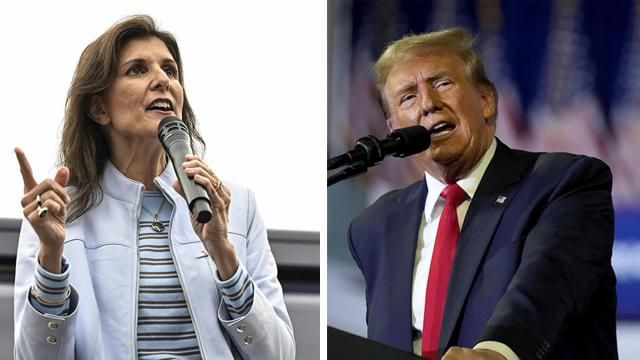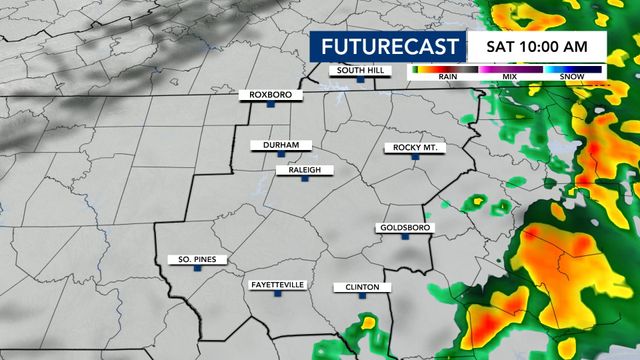Trump, Haley make final push in NC on last day of early voting for primary election

The two remaining rivals in the Republican presidential primary are poised for a final push in North Carolina Saturday as they look to sway Tar Heel State voters ahead of Super Tuesday elections.
Former President Donald Trump, who is seeking a second term after losing to President Joe Biden in 2020, is scheduled to speak at 2 p.m. at the Greensboro convention center. He’s hoping to build on the support of voters who narrowly delivered him North Carolina in 2020.
Former United Nations Ambassador Nikki Haley is scheduled to speak at 12:30 p.m. at Union Station in Raleigh. The former South Carolina governor isn’t expected to win the primary, but her performance in Tuesday’s election could be an indicator of Trump’s support among moderate voters in the state.
The visits are the latest by high-profile candidates, illustrating the importance of this closely contested state, where unaffiliated voters make up the largest bloc, followed by Democrats and Republicans, respectively.
Democratic Vice President Kamala Harris was in Durham on Friday, announcing $32 million in new funding for small businesses run by minorities and women.
Super Tuesday
Saturday is the final day of early voting before Election Day on Tuesday — when North Carolina will be among 15 states holding their primaries, a date known as Super Tuesday due to the large number of delegates up for grabs in the presidential race.
There’s no competition on the Democratic side of the aisle, where the North Carolina Democratic Party only allowed a single candidate to run in the state’s primary: President Joe Biden. Nonetheless, he’ll appear on North Carolina primary ballots next to an option for “no preference.” The no-preference tallies could be an indicator of voters’ enthusiasm for Biden, whose approval ratings have taken a hit over the economy and the handling of international affairs.
The Republican primary is only slightly less predetermined than the Democratic one.
Trump remains highly popular among North Carolina conservatives and is expected to cruise to victory over Haley, despite her Southern roots. Trump recently defeated Haley in her home state of South Carolina with 60% of the vote.
A late January Meredith College poll found Trump leading Haley 76% to 19% among North Carolina Republican voters. A mid-February East Carolina University poll found an almost identical 72% to 20% Trump advantage. On Friday, a High Point University poll showed Trump leading 69% to 24%.
When Republican voters go to the polls they’ll see seven names on the ballot, but Trump and Haley are the only candidates still actively campaigning. The rest have since dropped out, with several endorsing Trump.
Haley’s Republican support in the South Carolina primary came largely from college-educated GOP voters, many of whom oppose Trump, the Associated Press reported.
But that voting bloc is relatively small. Haley has also lost to Trump in the Iowa, Nevada and New Hampshire primaries.
Despite her string of losses in early primaries, Haley has stuck in the race. There are multiple issues that could force Trump out of the race, including multiple ongoing criminal trials as well as a legal challenge that claims he’s constitutionally ineligible to serve as president again — due to allegations surrounding his actions leading up to the Jan. 6, 2021, riot at the U.S. Capitol by his supporters. The U.S. Supreme Court is currently weighing those arguments.
Looking ahead to November
Michael Whatley, the North Carolina Republican Party chairman who Trump is now backing to take over the national GOP, told WRAL in January that Democrats can lose North Carolina and still win the White House. But the same is not true, he said, for Republicans — no matter who the party ends up nominating to take on Biden this fall.
“A Republican will have to win North Carolina to win the White House,” Whatley said in that January interview. “There’s just no path to 270 electoral votes without North Carolina.”
The recent Meredith and ECU polls indicated that the general election in November is still too close to call for North Carolina, which once again figures to be a key swing state.
When asked about a potential 2024 rematch between Biden and Trump, a large number of voters in each poll said they’re still undecided — or dislike both options.
The ECU poll showed 47% of North Carolina voters siding with Trump, 44% siding with Biden and another 10% saying they’re undecided or would vote for a third-party candidate. The Meredith poll showed 44% of voters siding with Trump, 39% siding with Biden and 16% saying they’re undecided or would vote for a third-party candidate.
Trump won North Carolina in 2016 and 2020, but each time with less than 50% of the vote due to third-party candidates. He beat Democratic challenger Hillary Clinton by 4.5 percentage points in 2016. Biden came much closer in 2020, losing by just 1.5 points. Democrats will be hoping to continue the leftward trend and flip the state blue.
In the past 50 years, North Carolina has only voted for a Democratic presidential candidate twice: Jimmy Carter in 1976 and Barack Obama in 2008.













